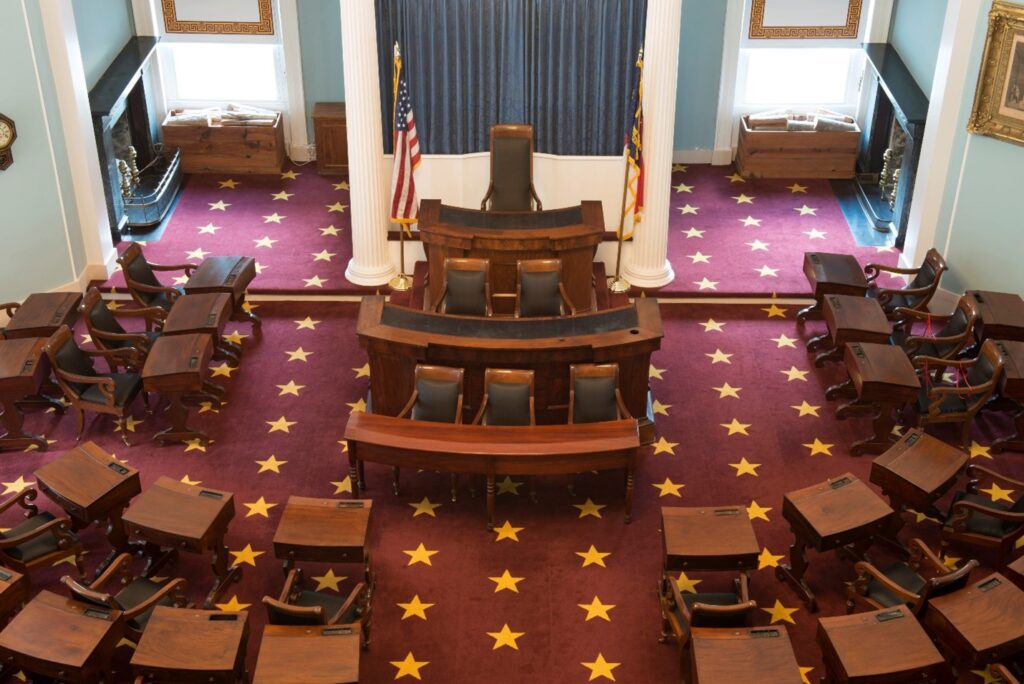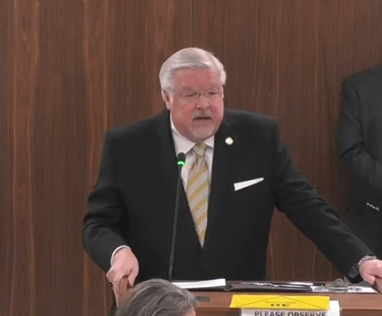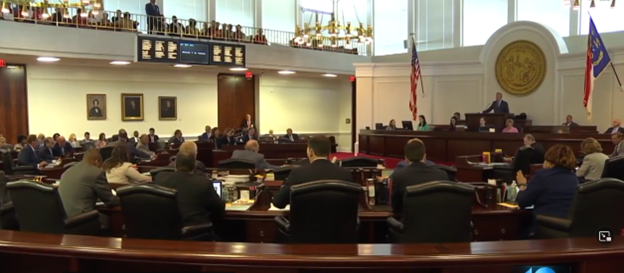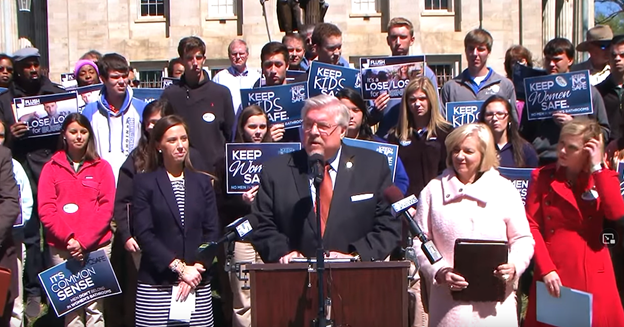
By L.A. Williams
Christian Action League
October 7, 2022
“If you are a person of integrity, you can have phenomenal influence as a lobbyist,” says Dave Kistler, president of the North Carolina Pastors Network.
He applauded the work of Christian Action League Executive Director Mark Creech during a Sept. 29 “Stand in the Gap” radio broadcast, specifically commending the Rev. Creech for his character, his passion and the effectiveness with which he functions in the North Carolina General Assembly.
During the hour-long radio show, titled “Understanding the Word of Political Lobbying: the Good, the Bad and the Ugly,” Creech explained the role of lobbyists, why it’s important for Christians to have a voice in the political arena, and how he treats his work as a form of pastoring. He also updated Kistler and co-host Dr. Jamie Mitchell, director of church culture and pastoral engagement for the American Pastors Network, on a few of the many issues that the CAL has worked on this year.

The Rev. Creech said his lobbying activity primarily involves speaking with lawmakers and testifying before legislative committees “to provide counsel and education on critical matters of moral import.” He said anyone who spends more than 20 percent of their time lobbying, must register with the state as a lobbyist.
“Lobbying lawmakers from a Christian worldview not only works to protect the interests of the church, but more importantly it holds up the biblical standard as a compass for lawmakers to follow,” Creech explained. “Christians are privileged in this country to be a part of the political process just like everyone else, and having a lobbyist at the table is a very critical means of influence – and in our case our client, the one we represent mostly – is the Lord Jesus Christ.”
Fielding questions about foreign influence in the state legislature and about the potential for corruption, Creech said there can be a corrupt element – someone or some group who abuses, misuses, or perverts the privilege given – in any enterprise. He said by and large lawmakers appreciate lobbyists because they provide much needed information, and he said the onus is on us, as citizens, to prevent corruption by electing people of character into office.
“Our representatives are the guardians of our great Republic, and, therefore, it is incumbent on us to vote people of character into office who love God and his son, Jesus Christ, love our Constitution and way of life, and operate with integrity. If foreign entities are having too much influence on our government that is also a reflection on us – the people – because we have a representative republic – we voted these people into office. What does that say about our need to focus on integrity and honesty in candidates and those who serve?” he said. “Lobbying is not the issue. Certainly the influence of foreign entities is part of the equation. But the bigger problem is more fundamental – it’s about us and who we elect.”
Further, Creech told radio listeners that the key to wielding influence with lawmakers is to build relationships.
“If the lobbyist is always true and honest, if he doesn’t know the answer to a question and admits he doesn’t know but will seek to find the answer; if he carefully works to show the utmost respect to the lawmaker’s office, never seeking to publicly embarrass him or her; if he keeps his conversations confidential; if he genuinely shows that he cares for the lawmaker as much as he does the issues he represents; if he always endeavors to stay on the subject and doesn’t get drawn into issues of personality; I think it’s amazing what can happen for good … without ever giving the politician a dime,” Creech said. “I believe the best of politics is done out of the personal relationships of trust that we forge with those in power.”

He said lawmakers on both sides of the aisle need to feel that they have a friend even when the lobbyist and legislator strongly disagree on an issue.
As for how lobbying relates to ministry, Creech said, “Of course, as a clergyman (I pastored for 20 years before accepting this calling and I’ve been a lobbyist now for 23 years), people look to you for spiritual guidance. As a lobbyist, I share the Gospel. I pray with lawmakers and their legislative staff. I attend the funerals of their loved ones. I share with them materials to help them with their grief. I listen to their confessions and tell them where they can find forgiveness and peace and what steps they might take. So spiritually, it’s a very strategic place to be. Some of the lawmakers say that they look to me as their pastor.”
When radio show hosts asked about current issues that the CAL is addressing in North Carolina and how those might relate to listeners in other states, Creech mentioned the League’s work to push back against a bill that would have brought a massive increase in sports betting to the Tar Heel state, a David vs. Goliath kind of battle that ended favorably when the House defeated the measure by just one vote. Creech addressed seven legislative committees as the bill made its way through the process, preparing a different presentation for each based on the committee’s role. He was one of only three lobbyists speaking against the bill, while the gambling industry sent 15 or so, with accompanying staff members, to try to push it through.

The CAL also helped House lawmakers see the wisdom in not taking up a medical marijuana bill that was passed by the Senate, Creech shared.
He updated listeners about the state’s position with regard to the overturning of Roe v. Wade, explaining that the Republican leadership in the General Assembly felt it prudent to wait until after the election in November to act because any pro-life legislation passed would likely be vetoed by pro-choice governor Roy Cooper, who has at least two more years in office.
“Republicans are quite bullish about reaching supermajorities in the House and Senate at the next election. Only three more Republicans are needed in the House and two in the Senate. So, if supermajorities are attained, then the Governor’s veto won’t matter. It can be overridden,” Creech said, adding that he would prefer the state pass a heartbeat bill, as has been mentioned by Speaker of the House Tim Moore, rather than the 15-week abortion ban that Senate leaders seem to prefer.
“The Christian Action League is working with a coalition of pro-life groups in our state to pass the best legislation possible,” Creech said.
Finally, the Rev. Creech impressed upon “Stand in the Gap” listeners the importance of their willingness to reach out to their elected officials.
“I have been telling the churches that support the Christian Action League for several years not to be cynical about the process. Your engagement is what makes the biggest difference,” he said. “For instance, as a lobbyist, I think I can usually articulate to legislators the pros and cons of an issue, but that influence will only go so far. Where we really get traction is when lawmakers are hearing from their constituents at home. That’s why it’s important to connect with these lobbyist groups, know the issues (they will sufficiently inform you), and then follow-up their work on your behalf with your own phone call, email, or fax, or your own letter written in your own words.”
Creech called that type of collaboration “remarkably effective.”
“It’s the constituents that have the greatest power. The lobbyist facilitates the information, but without the constituent engagement our task becomes significantly harder,” he added.
APN’s “Stand in the Gap” radio show is aired weekdays from 12:05 p.m. to 1 p.m. on more than 400 stations across the United States, including about a dozen in North Carolina. A recording of the show featuring the Christian Action League’s Mark Creech can be accessed via the APN website.
